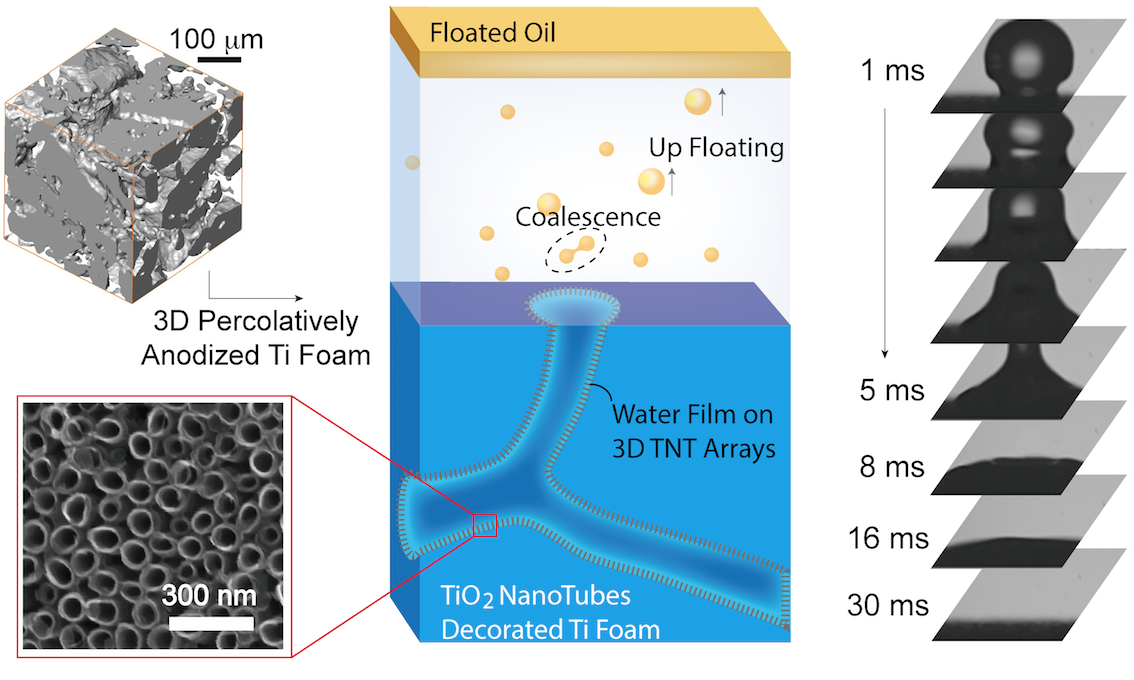Recently, a permeating anodic oxidation process has been developed jointly by Professor Kong Lidong from the School of Material Science and Engineering of Chongqing University, Professor Jia Chuankun from Changsha University of Science and Technology and Researcher Han Zheng from the Institute of Metal Research, Chinese Academy of Sciences, in collaboration with international teams such as Chemical and Engineering Research Institute, Agency for Science, Technology and Research of Singapore. The process allows for full coverage of super-hydrophilic coating in porous titanium 3D micro-channels (with pore diameter of 10-100μm and thickness of 1 ~ 5 mm), so that the permeation rate of water drops in porous titanium would increase by 5 orders of magnitudes. The high purity water phase will be obtained by allowing oil-in-water emulsion to pass the micro-channels, and the total content of organic carbon will be below 25ppm, and the oil-in-water separation efficiency will reach above 99.9%. Related research findings have been published in iScience, a sub-journal run by Cell, on August 31, 2018, under the title “Nanostructured Three-Dimensional Percolative Channels for Separation of Oil-in-Water Emulsions”.
Oil-in-water separation is a green technology that is used to separate the oil and water mixture to achieve recycling of used oil and purification and emission of sewage, and is now widely used in various areas such as treatment of restaurant sewage and petrochemical engineering. There is a network of micron-order 3D channels inside the porous titanium, with satisfactory chemical stability, resistance to acid and base corrosion and oxidation, and high specific strength, making it an ideal filtering material. However, porous titanium does not have the super wettability and cannot separate oil-in-water emulsion. In addition, limited by the size of its micro-channels, super-wettability modification is highly difficult using traditional means. To tackle this world challenge, the research team has developed a permeating anodic oxidation process to prepare and regulate the super-hydrophilic nano-tube coating in the 3D micro-channels of porous titanium, thus realizing efficient separation of oil-in-water emulsion. The research findings have broken the inherent bottleneck of traditional oil-water separation technology and have a promising application prospect.
The research has been supported by the Natural Science Foundation of China, the Foundation and Frontier Research Program of Chongqing, the Basic Scientific Research Operation Funds for Colleges and Universities allocated by the central government, State Key Lab of Mechanical Transmissions, Chongqing University, Key Laboratory of Advanced Energy Materials Chemistry, Ministry of Education and the 100-Team Program of Hunan Province. Jin Jian, the doctoral student of the School of Material Science and Engineering, Chongqing University, is the first author of the paper. Professor Jia Chuankun of Changsha University of Science and Technology, Researcher Han Zheng from the Institute of Metal Research, Chinese Academy of Sciences and Professor Sun Lidong from Chongqing University are corresponding co-authors.

Fig.1 Schematic Diagram of Super-hydrophilic Micro-channels and Oil-water Separation
Cell is one of the world top 3 main journals in the world. The other two are Science and Nature. Cell focuses on life science and currently has 3 sub-journals, namely, Chem, Joule and iScience. iScience centers on research of life, environment and other frontier areas.
Link of the full paper:
https://www.cell.com/iscience/fulltext/S2589-0042(18)30116-0#secsec 0090

